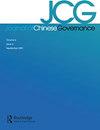What values are evaluated? An exploratory empirical study of the public values structure in Chinese local government performance evaluation through the case of the ‘Hangzhou model’
IF 3.7
3区 社会学
Q1 POLITICAL SCIENCE
引用次数: 2
Abstract
Abstract Performance evaluations often convey values promoted by the government. However, it is unclear in the Chinese context what ‘performance’ means when referring to appraised values because little empirical evidence exists, particularly regarding the relations between values. This study examines Hangzhou, a pioneering case among Chinese municipalities of comprehensive performance evaluation, to analyze the relations between values. We examined 2,422 performance evaluation reports and policies released to the public. After conducting content and social network analyses, we theorized the public values structure were composed of relations of hierarchy, proximity, and causality. Our findings indicate prime values were listed prior to instrumental or market-driven values. The proximity between public interest and quality is demonstrated by the highest correlation coefficients. Each value cluster contains a causal relationship, indicating one value is the means to another. We discuss the values-oriented approach to performance evaluation, the contextual nature of public values studies, and the limits of using public satisfaction in performance evaluation. As an exploratory study, this work identifies values advocated by local governments in China; such findings are absent from existing research. Moreover, this study provides a practical method for empirically studying public values.评估了哪些价值观?基于“杭州模式”的地方政府绩效评价公共价值结构实证研究
绩效评估往往传达政府倡导的价值观。然而,在中国的背景下,“绩效”指的是评估价值,这是不清楚的,因为很少有经验证据存在,特别是关于价值之间的关系。本研究以中国城市综合绩效评价的先行者杭州市为研究对象,分析其价值之间的关系。审查向社会公布的绩效评估报告和政策2422份。通过内容分析和社会网络分析,我们认为公共价值结构是由层次关系、邻近关系和因果关系构成的。我们的研究结果表明,主要价值在工具价值或市场驱动价值之前被列出。公共利益与质量之间的密切关系表现为最高的相关系数。每个值簇都包含一个因果关系,表明一个值是另一个值的均值。我们讨论了绩效评估的价值导向方法,公共价值研究的语境性质,以及在绩效评估中使用公众满意度的局限性。作为一项探索性研究,本研究确定了中国地方政府倡导的价值观;这些发现在现有的研究中是不存在的。此外,本研究为实证研究公共价值提供了一种实用的方法。
本文章由计算机程序翻译,如有差异,请以英文原文为准。
求助全文
约1分钟内获得全文
求助全文

 求助内容:
求助内容: 应助结果提醒方式:
应助结果提醒方式:


